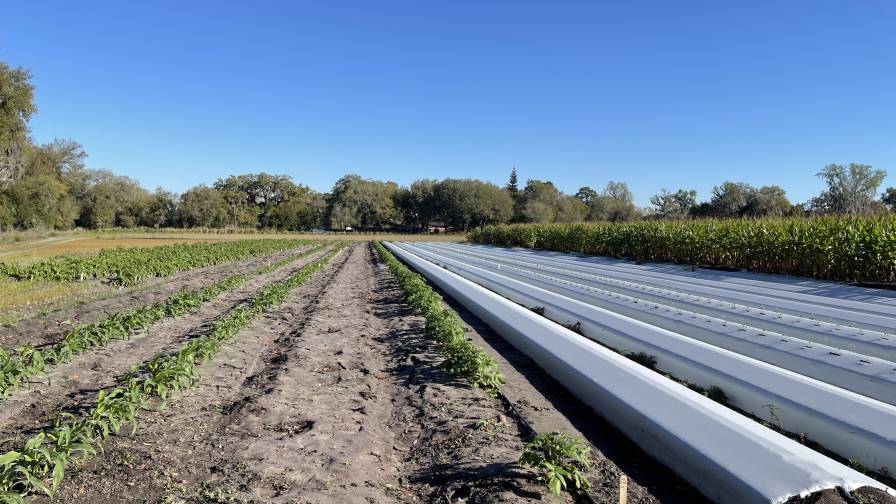Customers: Growers Cautiously Optimistic
The CropLife 100 dealers have shared their outlooks, but our editors also wanted to gauge what grower-customers are thinking. Short-term, Midwest growers are understandably cranky with weather problems throughout the season, including fall rains that delayed harvest and fertilizer application. At presstime, parts of Iowa were seeing heavy rain — to the tune of 2 inches in a night — during supposedly prime harvest time. In late fall, some fields were “lakes,” reports Tim McArdle, executive vice president and chief operating officer of Brandt Consolidated, Springfield, IL. Drying costs will be tremendous, he notes.
“Growers are going to be cash-strapped, they’re going to dependent on their lenders. And they’re probably going to be dependent on us to some degree with terms, but the concern to me is will the farmer have cash availability to conduct his normal business — here it would be to prepay the majority of his spring inputs to get a better price.”
At Mountain View Coop, Great Falls, MT, Operations Manager Frank Schumacher also expressed concern. “Our customers are frustrated with the current price of wheat — many of them did not sell their crop at the same time as they bought inputs, and wheat prices are down so revenue is not matching up with expenses — it’s out of sync with their marketing plan.
Credit and capital accounts receivable is going to be an issue, and the next 60 days will tell us how bad it is going to be.” Schumacher anticipates that growers will not be able to pay bills because they have not sold their crop — they’re not willing to sell at the price currently offered, and the situation “could get ugly.” In fact, he says if growers haven’t sold their crop by the time they need to go back to the bank for financing, banks will force them to sell because of tightening restrictions on lending.
Brent Sutton, president and general manager of Growers Fertilizer Inc., Lake Alfred, FL, has noticed that more of his customers (primarily citrus growers and ranches producing hay) need extended terms, and his company is working with the John Deere Farm Plan to help. “We’re doing more volume business with Deere than we’ve ever done in the past,” he says. “It’s a nice outlet for us to be able to get paid and give our customers help with their cash flow.”
He finds the mood among growers much more positive compared to this time last year, with citrus prices up and fertilizer and glyphosate coming down: “It’s definitely a more profitable environment for them.”
Markets have rallied for Midwest growers as well, and customers are seeing higher commodity prices now, points out Roger Oliver, president of Van Horn Inc., Cerro Gordo, IL.
“You can look at the futures prices for next year and at the input pricing we have and a lot of customers could lock in a profit for next year today,” says Jeff Eggleston, general manager of Hintzsche Fertilizer, Maple Park, IL (in late October). In fact, McArdle sees growers considering expansion, as some of his customers are aggressively seeking to rent more ground for 2010.
Complicated Relationships
Retailers say growers are approaching 2010 inputs cautiously, in part because some felt burned by last season’s price issues. In fall of 2008 many dealers used contracts to sell prepay fertilizer to customers.
“Prices were running up and we could not accept all of the risk — plus our customers wanted to lock in the best price possible,” says McArdle. When prices tumbled some growers no longer wanted to honor those contracts. “We were fortunate in that most of the product we sold was already applied, and we did not have many of these circumstances come up. I do know of dealers who did.
“What many in the supply chain do not understand is that we can force a customer to honor a contract, but possibly lose him as a customer,” he says. “We have to manage the gray areas and handle each case as required. However, I am a big proponent of contracts, as they eliminate the issues 90% of the time.”
Dealers themselves were caught by surprise by the price hikes and dips. Richard Warner of Warner Fertilizer, Somerset, KY, feels most customers aren’t bitter and don’t blame retailers for increases. Then, too, relations between dealers and their suppliers were tested. “I’d say we’re healing. Fertilizer prices have been a sore subject for retailers and distributors,” says Van Horn’s Oliver.
Most of the dealers we talked with could boast of good relationships with their growers. “In this industry, it’s all about relationships,” says McArdle. “Your customer has to trust that you’re working for his best interest at all times. If you do that, these guys will not kick you out of bed over mistakes and things that happen.”
Dealers seem to be building and holding that trust. For instance, a whopping 82% of our CropLife 100 retailers agree or strongly agree that customers buy the majority of their seed based on recommendations from local retail experts.
Crop protection product salesmen also appear to be getting respect. Dan Kennedy, general manager at Ritter Crop Services, Marked Tree, AR, tells of basic suppliers trying to get around his staff to direct-sell in the past. “I’ve wished them luck since they would have one guy vs. my 19.”
For 2010, he sees business getting back to normal. “Our business has been here for more than 100 years. Relationships with growers will stay the way they have always been, and we will take care of our customers the fair way,” he says.
McArdle believes growers have changed. Many second- and third-generation growers have gotten ag degrees. “I constantly tell my guys that if they’re not smarter than a grower is on a specific subject and can’t provide him with relevant information, he doesn’t need you,” he explains.
Growers Take The Wheel
Are dealers worried about more customers no longer needing custom application services? One quarter of our CropLife 100 does see the move to growers doing their own spray work as a threat.
“I think there’s been a lot of sprayers sold to farmers in the last five years,” says McArdle. But it all comes down to labor, and some farms just don’t have the staff to handle application as well as planting, tillage, and more — though McArdle has found some families with second generations coming into the business will have the human resources to do it themselves.
Dave Coppess, vice president of sales and marketing at Heartland Coop, West Des Moines, IA, has seen a half-dozen very large commercial growers — with their sons joining the business — doing their own custom work in his territory. “They’ve invested in a sprayer, and last year they invested in a dry box. They already have semis and can go to the river and buy a truckload of fertilizer, paying the same price we do. Some may even doing some spraying for a neighbor.”
In addition, fertilizer blender manufacturers tell Coppess that a number of growers have installed their own blenders for the first time. This activity highlights the region’s changing landscape: “A lot of guys out there are 65 years old and exiting the business. The land is going to go to more commercial farms — these are people that are willing to pay for the things they want, so we have to find services they value and are willing to pay for,” he says.
That’s when “a new way of working with the customer” comes in, McArdle says. “We say: ‘Let us work with you. You’re not buying a package or mini-bulk, but you’re coming into our facility, and we can provide you with a tank. We’re going to inventory that product, blend that product so you know it’s right, with the right rate, and you pick it up and take it out and put it in your sprayer.’ Many of them are taking us up on that,” he says.
Grower application may ultimately be limited. McArdle emphasizes that his company’s customers tackling in-season spraying still come to Brandt for preplant fertilizer work. And Warner says once his customers start putting in crops, they want most fertilizer custom-applied because they’re too busy doing something else.
Selling Services
Grower application was one topic that CropLife editors brought up at a recent informal meeting of leading retailers to discuss industry trends. A conclusion: Farmers are being encouraged to do more application work themselves because retailers haven’t accurately justified the costs to growers. Participants are concerned that they’ve given too much away to growers over the years in the form of services — and that the whole structure of product movement to the grower will have to change from the current system. Their feeling is retailers have to decide what value they want to bring to big customers who will be around for the next 10 years. If smaller customers don’t want to pay for services, a dealer won’t be able to provide them service.
Sutton of Growers Fertilizer in Florida would stand by the complimentary services his company offers. “Salesmen are out in the field constantly bug checking and making recommendations for sprays,” he explains. His staff usually finds a problem before a grower is even aware of it. Soil sampling with fertilizer recommendations is also a free service.
And while precision agriculture services have been growing, CropLife 100 retailers say some growers will always hit a wall with the technology. “A vast majority of people out there are not really into precision,” says Oliver. “Our customers aren’t really willing to pay for it.”
McArdle agrees: “About 35% to 40% of our customers are doing some sort of precision agriculture. For others the learning curve is steeper, but we feel the investment is justified and profitable.”
Risk management tools will be a big opportunity to get in solid with the more professional grower, believes Coppess. “Our sales team is focused on their technical ability to help the grower choose the right seed, the right crop nutrients, crop protection products, but I am not sure the farmer, and in particular the commercial grower, finds as much value in that as they used to,” he says.
“I feel we have to shift as ag retailers to understand what the growers are going to value. The growers have told us that grain marketing skills are what they do value, so I think that, over the longer term, we have to shift the focus of our sales team to become more farm manager-type people,” Coppess says.





